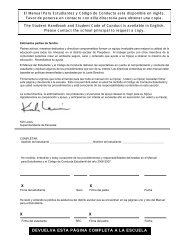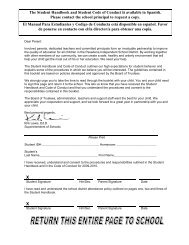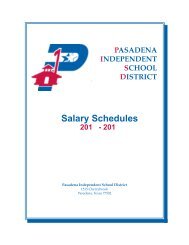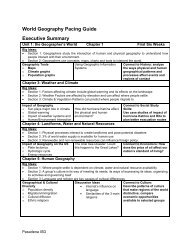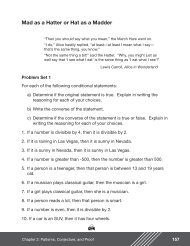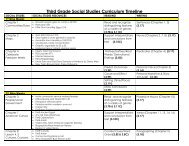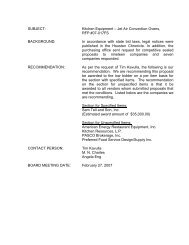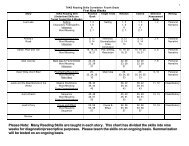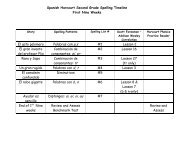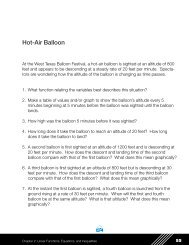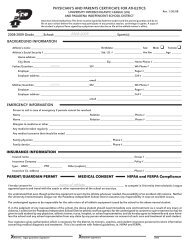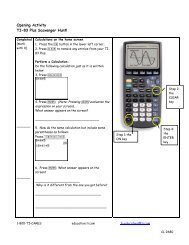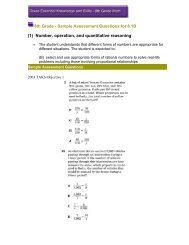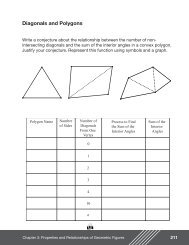Intermediate Mini Conference - Pasadena Independent School District
Intermediate Mini Conference - Pasadena Independent School District
Intermediate Mini Conference - Pasadena Independent School District
You also want an ePaper? Increase the reach of your titles
YUMPU automatically turns print PDFs into web optimized ePapers that Google loves.
Presenter <strong>School</strong> Subject<br />
Grade<br />
Level Title of Session<br />
A-01 Connie Ellis, Schneider Math 6 M&M Graphing<br />
Carolyn Graham, Middle<br />
with Fractions,<br />
and David Janda <strong>School</strong><br />
Decimals, and<br />
Percents<br />
Description<br />
6.1B, 6.3B, and 6.10D Students will make<br />
predictions before the activty begins in regards to<br />
the color of M&M's and how many of each color that<br />
their bag will contain. Then students will create a<br />
bar graph using the bag of M&M's and record their<br />
each individual data using their M&M's. The<br />
students will transfer the data from the bar graph to<br />
fractions and then change them to decimals and<br />
then to percents. Finally students will compare and<br />
contrast their actually results with their predictions.<br />
A-02 Kathleen Walker<br />
Murrell<br />
Dobie HS Math 6-7 Graphing Yes! This session will highlight the use of the<br />
Calculators in Pre- graphing calulator in model lessons for Pre-AP<br />
AP Math? mathematics. Come learn to use the calculator for<br />
exploration and application. See how you can help<br />
your students to develop their numerical reasoning<br />
and algebraic thinking. The target audience for this<br />
session will be Pre-AP 6th and 7th grade teachers.<br />
A-03 Debbie Jacobs Carter<br />
Lomax<br />
Math 6-8 Algebra and M &<br />
M's<br />
A-04 Michelle Lawrence Miller Math 7-8 Vocabulary and<br />
Math Literacy<br />
Strategies<br />
This lesson will show a real world application for<br />
algebra. Particpants will use algebra to determine<br />
the exact number of each color of M&M's in a bag<br />
without counting or seeing the candy. The specific<br />
skills involved in this lesson are working with<br />
varibles, writing expressions, and solving two-step<br />
equations.<br />
Many students are able to manipulate numbers and<br />
perform process steps, but lack a deeper<br />
understanding of the bigger concepts in<br />
mathematics. This hinders the students' ability to<br />
communicate effectively in math, connect big ideas,<br />
or utilize higher-thinking processes to solve<br />
complex problems. This session will highlight<br />
several strategies (games, activities, quick writes,<br />
journaling, etc.) that you can use to assist your<br />
students' grasp of important math vocabulary.<br />
A-05 Kelley Cabrera Park View Math 7-8 Not so plain, Make the coordinate plane come to life with fun<br />
Coordinate Planes interactive games and activities. Not only will these<br />
activities help the students connect with the content,<br />
but with their teacher and other classmates. Some<br />
of the activities include a life size coordinate grid,<br />
interactive bulletin board, graphing foldable,<br />
Teacher Says, and much more.<br />
A-06 Renee Gobea and<br />
Bianca Hunter<br />
Thompson Math 8 Using the Four<br />
Corner Model<br />
Students will use different representations of data<br />
(table, graph, equation, and verbal description) to<br />
analyze two text messaging plans. Students will<br />
have to determine what plan is a better deal based<br />
to their needs.<br />
1
A-07 Andre Dean and<br />
Jennifer Hare<br />
Queens Math 8 "ERPing" and<br />
Heat Transfer<br />
The purpose of this session is to present stategies<br />
that will help teach the eighth grade concepts of<br />
balancing equations and heat transfer. In the<br />
balancing equation segment teachers with be<br />
shown how to set up tables using elements,<br />
products and reactants in order to determine if a<br />
chemical equation is balanced. In the heat transfer<br />
section teachers will be shown a powerpoint and<br />
folable that can be used to teach conduction,<br />
convection and radiation.<br />
A-08 Patricia Jackson<br />
and Citlali<br />
Guerrero<br />
South<br />
Houston<br />
Math 7 What's for Dinner? Students will look through various menus from local area<br />
restaurants. Students will select a meal for themselves.<br />
They will be allowed to create their meal using various<br />
items from multiple restaurants if they choose. They will<br />
record the items they purchase and how much each item<br />
costs on their paper. Students may NOT switch once<br />
they have written down an item. Once students have<br />
determined their total, the teacher will assign them a<br />
certain tax amount, as well as a gratuity amount. The<br />
student will determine how much is owed in both regards<br />
and will record that on their paper. The teacher will then<br />
inform the student that everyone gets a student discount<br />
of 10% on their meal. It will be up to the student to<br />
determine if they want that 10% to be taken before tip<br />
and tax, or after. The student will need to record their<br />
totals on a piece of notebook paper and then turn it into<br />
the instructor, explaining why they chose when to take<br />
their discount.<br />
A-09 William Anders Beverly Hills Technol<br />
ogy<br />
A-10 Melinda Connolly<br />
and Bernie<br />
Gernander<br />
San Jacinto Tech.<br />
App.<br />
6-8 Lab Managemernt<br />
- Demo Using MS<br />
Frontpage 2003<br />
The lesson is primarily designed as a demonstration<br />
for effective use of a computer lab setting. Many<br />
campuses have computer labs available for<br />
scheduling by all content area teachers. However<br />
those not used to working in this setting are<br />
presented with new challenges when removing their<br />
students from the clasroom and placing them in a<br />
computer lab setting.<br />
6-8 Gaggle Will demostrate how to use Gaggle email, message<br />
boards, chat rooms and digital lockers. We will<br />
show examples on how to incorporate Gaggle into<br />
your classroom. Email is a common way to<br />
communicate in the workplace and it gives students<br />
real life experience.<br />
A-11 Mike Marlar Instructional Technol<br />
Technology -ogy<br />
Adm.<br />
Building<br />
5-8 PowerPoint Tips<br />
and Tricks<br />
In this class, the participant will learn tips and tricks<br />
in order to better utilize Microsoft PowerPoint 2003.<br />
A CD with 1,000+ PowerPoint backgrounds will also<br />
be provided to participants<br />
2
A-12 Megan Jannise<br />
and Jeanie Davis<br />
Southmore<br />
Technol<br />
ogy<br />
5-8 Using Video<br />
Technology in the<br />
Classroom<br />
In this session, we will explore different ways to use<br />
video technology in the classroom. Teachers will<br />
learn ways to incorporate video technology in<br />
subjects across the curriculum, as well as ways to<br />
begin a video technology class at their school. We<br />
will discuss equipment needs, basic fundamentals<br />
of video, and ways to apply this at your school. For<br />
those teachers who already have a video program,<br />
this will be a great place to share ideas.<br />
A-13 Frank Sanchez Milstead Science<br />
with<br />
Technol<br />
ogy<br />
6 Guided Reading in<br />
Science/Small<br />
Groups with<br />
Technology<br />
Incorporated<br />
A-14 Susan Jennings Beverly Hills Science 6-8 Don't Ask Jeeves -<br />
Use the PISD<br />
Electronic<br />
Resources!<br />
A-15 Ashley Keilers Carter<br />
Lomax<br />
A-16 Vanessa Schultz<br />
and Quan Nguyen<br />
This sesson will demonstrate how 6th grade<br />
Science can incorporate guided reading with small<br />
groups. A video will show how a guided reading<br />
group works with science and the expectations of<br />
the small groups work along with it in a 6th grade<br />
Science classroom. Technology will be<br />
incorporated into one of the small groups rotation<br />
activity.<br />
A hands-on demonstration to teachers how to use<br />
PISD Electronic Resources(Grolier (New Book of<br />
Popular Science), Encyclopedia Britanica (Learning<br />
Materials Activities), Facts on File,EBSCO) to find<br />
content-related reading materials that meet the<br />
needs of all students. These resources allow<br />
teachers to search resources by lexile level and<br />
enables teachers to provide students with contentrelated<br />
materials above and below the textbook.<br />
Science 5 I Will Survive Teachers will be shown how science in the<br />
classroom can be brought to life through the use of<br />
small group challenges that make learning the<br />
TEKS fun. Participants will experience Darwin's<br />
"survival of the fittest" in action.<br />
Beverly Hills Science 6-8 Animals in the<br />
Science<br />
Classroom<br />
This session will be an overview of the benefit of<br />
animals in the Science classroom. Data from<br />
research will be presented to show how animals are<br />
beneficial in calming people as well as other health<br />
benefits. Animals create a sense of community and<br />
ownership in a classroom. They can also be used in<br />
a myriad of life science lessions.<br />
A-17 Maricela<br />
Rodriguez and<br />
Lena Toole<br />
San Jacinto Science 6 Earth Science in a<br />
Bag<br />
This is one of the great ideas presented at this<br />
year's CAST conference. Learn how to make a<br />
hands-on, "portfolio-style" Earth Science Unit Bag.<br />
Content used and daily activities to build/ assemble<br />
the bag are shown and discussed. Attendees will<br />
make a smaller version, receive a template to cut<br />
and make their own "Bag" and several ideas to use<br />
and/or modify to any level of rigor. Students will<br />
take ownership of their "masterpiece" at the end of<br />
the unit, demonstrating relevance<br />
A-18 Dan Connolly,<br />
Stephanie Mesa,<br />
Denise Ridgway<br />
Bondy Science 7-8 Attention<br />
Grabbers for<br />
Science<br />
The session will include inexpensive teacher<br />
demonstrations for grabbing student attention and<br />
focusing on science concepts.<br />
3
A-19 James Golden South<br />
Houston<br />
A-20 Marcy Bieber and<br />
Rashad See<br />
A-21 Nora Martinez South<br />
Houston<br />
General 5-8 Integrating Rigor<br />
and Relevance<br />
into the<br />
Classroom: When<br />
the Rubber hits<br />
the Road<br />
Summit All 6-8 Positive<br />
Behavioral<br />
Supports in the<br />
Academic<br />
Classroom<br />
Spanish<br />
1<br />
(L.O.T.E<br />
.)<br />
7-8 Accelerated<br />
Learning<br />
Notebooks for the<br />
L.O.T.E.<br />
Classroom<br />
Teachers will be presented with HOW to intergrate<br />
Rigor and Relevance in the Classroom. Real<br />
Examples will be provided, and a discussion will<br />
follow. Handouts will be provided which will assist<br />
teachers to Integrate Rigor and Relevane into the<br />
Classroom.<br />
We all know that academic success is tied to<br />
positive classroom behaviors. How students aquire<br />
these positive behaviors is up to us. This workshop<br />
will include: 1. Relationship Building 2. Creating a<br />
level system in your classroom 3. Pre-teaching<br />
and Re-teaching expectations 4. Tying academic<br />
work to the levels earned by the student 5.<br />
Reinforcement of Positive Behavior<br />
Teachers will create a Notebook correlated to<br />
Spanish I Buen Viaje. Students will be speaking in<br />
the target language and accellerating their learning<br />
with chunked homework assignments. Sections<br />
covered will include warm-ups/bell ringers, a class<br />
Social Contract/Syllabus, vocabulary, grammar,<br />
products and workbook. A brief description of<br />
workstations will also be included. Teachers will<br />
receive handouts and/or a CD rom with samples of<br />
notebook pages.<br />
A-22 Matrice Henry South<br />
Houston<br />
ELA 8 Racing<br />
Vocabulary<br />
During this session, participants will receive a<br />
chance to participate in a vocabulary<br />
activity(prefixes) using a game format. Participants<br />
will work with a partner to discuss prefixes and have<br />
a brief study session using the words, and race with<br />
their partner by racing to find the meaning. While<br />
working in groups, participants will have the<br />
opporunity to build relationships and assist each<br />
other in fun, energetic way.<br />
A-23 Robin Cate and<br />
Cecily Frazee<br />
Milstead<br />
ELAR<br />
with Co-<br />
Teach<br />
5 Read Aloud The purpose of this session is to show teachers<br />
how to plan for and choose read-aloud books in a<br />
co-teach environment. We would also demonstrate<br />
how to use read alouds across curriculum with nonfiction/guided<br />
reading groups.<br />
A-24 Karen Brown &<br />
Barbara McIndoe<br />
Miller<br />
Langua<br />
ge Arts<br />
5-8 Color Me Smart Using post-it notes and highliters to take notes will<br />
set a purpose for reading. It provides an<br />
opportunity for students to practice skimming,<br />
critical thinking and analysis as they read. It also<br />
builds on comprehension and understanding. Using<br />
color has been known to increase retention and<br />
memory as well as categorizing terms.<br />
4
A-25 Kirby Anderson<br />
(Jennifer Johnson)<br />
and Connie<br />
Guillory<br />
Southmore Reading 7-8 Who Are You? The title "Who Are You?" is a reference to<br />
characterization. Authors often build their work<br />
around a key character so we will teach our<br />
students how to analyze characters to determine<br />
the key elements of the story or passage and<br />
support their responses by referencing text and<br />
their own experiences. Justifying their choices will<br />
be a key component of our presentation and we will<br />
demonstrate several methods which we feel work<br />
well with our students to help them comprehend<br />
what they read.<br />
A-26 Deborah<br />
Vanderhoef and<br />
Jenifer Hill<br />
A-27 Shelley Myers and<br />
Jill McLain<br />
Thompson ESL 8<br />
Multi-Cultural<br />
Research Project<br />
with Links to<br />
Grants and<br />
Service Learning<br />
Projects<br />
San Jacinto ELAR 6-8 What Did You<br />
Mean By That?<br />
Relationships - sharing traditions, music, etc. of<br />
ethnic groups represented in <strong>Pasadena</strong> ISD. It<br />
teaches tolerance and respect. Rigor - incorporates<br />
levels of research and the writing processes, along<br />
with an oral/visual presentation. Relevance -<br />
encouraging students to learn about the cultures of<br />
their peers and cooperative learning.<br />
Looking for a new approach to teaching style, tone,<br />
and mood? This session will demonstrate a 3-part<br />
lesson. In this cross-curricular study, artwork is<br />
used to focus on style, tone, and mood in writing .<br />
Visual word bank scaffolds lesson for all learners or<br />
provides an opportunity for differentiation.<br />
A-28 Erin Stocco Southmore English 6-8 Successful<br />
Seminars<br />
Teachers will be given graphic organizers and tips<br />
for creating successful seminars that challenge<br />
student problem solving and critical thinking skills<br />
through facilitated class discussion.<br />
A-29 Susan Calvin and<br />
Danyel Enderle<br />
Jackson ELA 7 Technology in the<br />
ELA Classroom<br />
Growing out of your overhead? We will quickly walk<br />
through a vocabulary, combining sentences, and<br />
DOL lesson that use PowerPoint, a projector,<br />
uploading digital photography, and a scanner. We<br />
will discuss the pros and cons of using new<br />
technology, and finally, I will show you some<br />
PowerPoint tips. We will also show you a lesson<br />
that incorporates a video.<br />
A-30 Nick Weiss Beverly Hills English<br />
Langua<br />
ge Arts<br />
5-8 Using Magic in the<br />
L.A. Classroom<br />
Using magic to lead into lessons or to reinforce<br />
aspects of lessons can be fun and incredibly<br />
effective in helping students remember what is<br />
being taught. In this session, you will learn 3<br />
classroom-friendly magic tricks that address critical<br />
thinking, spelling and vocabulary, plot, creative<br />
writing, story elements, problem resolution,<br />
inference, context clues and much more.<br />
5
A-31 Amber Kapner and Park View English 6-7 "Jazzin' Up<br />
Lynnette Palmer<br />
Sentences"<br />
A-32 Jill Butler, Veann<br />
Richards, Tara<br />
Crum, Lisa Roth<br />
Queens, Social<br />
Thompson, Studies<br />
Beverly Hills<br />
6 Round Table 6th<br />
Grade Curriculum<br />
We will read the children's book, Snow White<br />
Sheep, collecting small sentences and phrases<br />
using the word "said." The small sentences that are<br />
chosen will be re-written by using "jazz-it-up"<br />
techniques. "Boring" sentences will then be written<br />
and exchanged with other small groups. After the<br />
exchange, the "jazz-it-up" techniques will be used to<br />
paint pictures in the mind of the reader. The<br />
"jazzed-up" sentences will then be used with more<br />
descriptive ways to use “said” because “said is<br />
dead!”<br />
We will be having a round table discussion<br />
regarding the 6th grade Social Studies curriculum<br />
focusing on Scope and Sequence and CBA's for all<br />
6th grade Social Studies teachers.<br />
A-33 Marion Grant Park View Texas<br />
History<br />
A-34 Lance Donoho,<br />
Misty Riggenbach,<br />
Maggie Allen<br />
A-35 Glenda P.<br />
Neidecker<br />
A-36 Pamela Brooks<br />
and Darlene<br />
McCorvey<br />
San Jacinto Social<br />
Studies<br />
South<br />
Houston<br />
Administrati<br />
on Building<br />
Social<br />
Studies<br />
General<br />
and<br />
Special<br />
7 Using Picture<br />
Books to Teach<br />
Texas History<br />
6-8 Cowboy Up To<br />
Vocabulary<br />
7-8 Search Strategies<br />
101: A Practical<br />
Guide to Using<br />
PISD Electronic<br />
Resources<br />
5-8 Accommodations<br />
and Modifications<br />
In this session I will share picture books that will<br />
enhance all the concepts taught in Texas History.<br />
Picture books are an asset in any classroom,<br />
regardless of age. I will share ideas that will help<br />
you integrate social studies and language arts. I<br />
believe that sharing books helps to build<br />
relationships, but it touches on the rigor and<br />
relevance components as well.<br />
This presentation will demonstrate vocabulary<br />
strategies proven to increase real world<br />
understanding of Social Studies terms. It will also<br />
highlight curriculum on wheels machines as a tool<br />
for building in rigor and relationships.<br />
Participants will discover that research is a process,<br />
not a specific formula that works with every<br />
database. We will talk about the most effective and<br />
efficient way to utilitze a variety of electronic<br />
resources, including Facts on File, Gale Student<br />
Resource Center, and EBSCO. Keyword, subject<br />
and boolean searching will also be discussed, along<br />
with the importance of navagating from one<br />
document to another within the databases. During<br />
this session, participants will have time to practice<br />
these search strategies so they can become<br />
proficient in using the PISD electronic resources to<br />
fulfill their need for specific and pertinent<br />
information.<br />
Accommodations in the general education<br />
classroom provides equitable access during<br />
instruction and assessments for all students.<br />
Accommodations assist in making the information<br />
or learning activity relevant to the student's current<br />
and future life. Come experience strategies that will<br />
assist in building relationships as well as producing<br />
successful students.<br />
6
A-37 Shawn Fojtik, Jill<br />
Smith, Amy Kranz<br />
A-38 Carolyn Mashburn<br />
(Julie Reed)<br />
Guidance<br />
Center<br />
Alternati<br />
ve<br />
Campus<br />
English<br />
Langua<br />
ge Arts<br />
5-8 You're Going to<br />
the Guidance<br />
Center<br />
5-8 6 Traits of Good<br />
Writing in the<br />
Inclusive <strong>School</strong><br />
Session will provide an overview of the Guidance<br />
Center and the progress we have made over the<br />
past couple of years. Participants will be given the<br />
opportunity to have their questions concerning the<br />
Guidance Center answered. Contact information for<br />
the Guidance Center teachers will be provided in<br />
order to encourage communication between home<br />
campus teachers and the teachers at the Guidance<br />
Center.<br />
Join us to get some great strategies for teaching the<br />
6 Traits of Good Writing. Participants will receive<br />
good ideas, lessons, and activities to help with state<br />
assessment. The sessions will incorporate how to<br />
score writing samples for students with disabilities.<br />
A-39 Elizabeth Alvarado Milstead Special<br />
Educati<br />
on/Gen<br />
eral<br />
A-40 Luci Weaver<br />
Must<br />
also<br />
regist<br />
er for<br />
B-40<br />
Instructional Technol<br />
Technology -ogy<br />
Adm.<br />
Building<br />
5-8 Co-Teach<br />
Classrooms<br />
5-8 Building Teacher<br />
Webspace<br />
What a co-teach classroom looks like. The<br />
importance of communication and planning of both<br />
the inclusion specialist and regular ed teacher. It<br />
will also include suggestions and helpful hints to<br />
make the classroom successful and all students<br />
succeed.<br />
Teachers will learn an easy way to create their own<br />
personal webspace for their students. This space<br />
will allow teachers a place to post information,<br />
reviews, lessons, and any other information for<br />
students to view.<br />
B-01 Doug Brown Miller Math 5-8 Math Counts<br />
Making Math Fun<br />
and Relevant<br />
B-02 Mary Joy Santos Rick<br />
Schneider<br />
Middle<br />
<strong>School</strong><br />
Math 6 Let's Go<br />
Shopping!<br />
This session will describe a Saturday Math Club<br />
that utilizes mentors, activities, and games to teach<br />
and reinforce math concepts and skills and how<br />
they fit into various careers.<br />
Teachers will utilize the Ads to teach discounts and<br />
percents. This has all the 3 R's because they can<br />
be seen in our daily life. This activity is very rigorous<br />
when teachers include unit price, percents,<br />
discounts, and change. The relationship comes into<br />
picture when this is actually discussed with parents<br />
to prepare for marketing or for planning what to buy.<br />
B-03 Kara Walker San Jacinto Math/<br />
Special<br />
Educati<br />
on<br />
Math<br />
6-8 Holt and the<br />
Promethian Board<br />
I will demonstrate ways to integrate the Promethean<br />
board with the new Holt Math Curriculum. This will<br />
include how to use the online resourcs to enhance<br />
students' ability to take notes, record practice<br />
information and gain math understanding. I will also<br />
show how to turn Holt pages into Flip charts.<br />
B-04 Shelly Jaynes and<br />
Christine Veltman<br />
Bondy Math 7 Using a<br />
Promethean<br />
Board in Math<br />
Teacher will receive an overview of how to make<br />
math lessons meaningful and interactive through<br />
the use of a promethean board. You will learn how<br />
to create a complete lesson including: warm-up,<br />
examples, practice, etc.<br />
7
B-05 Gretchen Kent,<br />
Chanel<br />
Blackledge, Sarah<br />
Evans<br />
B-06 Elicia Audish and<br />
Erika Peugeot<br />
Jackson/So<br />
uthmore<br />
Math 7-8 Unit Dog he Unit Dog activity from the LTF Resource<br />
incoorporates volume and surface area into a<br />
hands on activity. The students explore the<br />
resulting effects on surface area and volume when<br />
dimensions of a shape are changed proportionally.<br />
The students create their own larger unit dog and<br />
discuss how the ratio of volume to surface area<br />
helps to determine the climate in which they live.<br />
*This activity is also appropriate for 7th grade Pre-<br />
AP Math.<br />
Park View Math 8 Theme Park<br />
Formula Project<br />
During this session, the presenters will pass out<br />
materials and discuss how successful this project<br />
has been during the Gear Up Summer <strong>School</strong>. The<br />
presenters will show how to use this hands on<br />
miniature building project in conjunction with regular<br />
Teks aligned lessons during the 8 th grade unit on<br />
Geometric formulas. After each formula lesson,<br />
students use the formula to measure and create a<br />
theme park ride and build it onto a board( with<br />
ofam, toothpicks, popsicle sticks etc..). This gives<br />
them an opportunity to make the formula relevant to<br />
a real life application ( such as building) and most<br />
kids are interested in theme parks. It also is a group<br />
project so it builds relationships. It could even lead<br />
to finance lessons and there is an optional<br />
computer project for graphs along with a paper and<br />
presentation. Ruberics and outlines are available for<br />
all parts of the project and it could easily be<br />
modified for other grade levels!<br />
B-07 Kathleen Walker<br />
Murrell<br />
Dobie HS Math 8 Calculators and<br />
Multiple<br />
Presentations in<br />
Algebra 1<br />
This is an opportunity for Algebra 1 teachers to<br />
improve their own graphing calculator skills and to<br />
learn ways to help their students to use multiple<br />
representations to make connections in algebra.<br />
The calculator will be used to foster the graphical,<br />
numerical, analytic, and verbal development of<br />
students. Use of tables and iterative processes will<br />
be emphasized. Come learn to use the calculator<br />
for exploration and application. The target audience<br />
for this session will be Pre-AP Alegebra 1 teachers.<br />
B-08 Peggy Ware<br />
(Smith) & Richard<br />
Shepherd<br />
Southmore Math 5-8 Algebraic<br />
Reasoning<br />
We will present two lessons that teach algebraic<br />
reasoning by incorporating the development of<br />
Lessons: Mosaics precesses to identify patterns and build proportional<br />
and Building<br />
Fences<br />
reasoning problems. Students workin partners,<br />
using manipulatives (toothpicks, tiles and graph<br />
paper) to create their mosaic tiles and fencing.<br />
They will be required to construct appropriate<br />
graphs for each activity which include both linear<br />
and non-linear graphs.<br />
B-09 Jaqueta Dunn Park View Technol<br />
ogy<br />
6 Self Portrait<br />
Similie Poems<br />
8<br />
Often poems do not give much to the imagination.<br />
Everyone’s perceptions of a poem can be different.<br />
Using pictures embraces the imagination of the<br />
audience. Using technology allows students to<br />
capture their imagination. Teachers will hear<br />
suggestions that can help their students build their<br />
imagination through poems and pictures using<br />
computers.
B-10 Diane Marsalis<br />
and Denise<br />
Ridgway<br />
B-11 Mike Marlar<br />
Limit<br />
to 20<br />
Bondy<br />
Technol<br />
ogy<br />
Instructional Technol<br />
Technology -ogy<br />
Adm.<br />
Building<br />
6-8 Creating Lessons<br />
in TrackStar<br />
Using TrackStar to organize lessons utilizing<br />
technology (applicable to any subject.)<br />
5-8 Inspiration During this course, participants will be introduced to<br />
the basic functions of Inspiration, a program<br />
designed to assist with the creation of graphic<br />
organizers. This program encourages learning in<br />
multiple modes. As a result, students gain and<br />
retain a better understanding of concepts and<br />
demonstrate knowledge, improving their<br />
performance across the curriculum.<br />
B-12 Shane Tout Instructional Technol<br />
Technology -ogy<br />
Adm.<br />
Building<br />
5-8 ACTIVClassroom Using ACTIVotes to encourage class discussions<br />
and higher-order thinking.<br />
B-13 Ann Jablonski Instructional Technol<br />
Technology -ogy<br />
Adm.<br />
Building<br />
B-14 Kris Manning Miller Science 8 Interactive<br />
PowerPoint<br />
B-15 Cynthia Martinez-<br />
Bagwill<br />
5-8 PhotoStory Use digital images along with narration to tell a<br />
story. This software is free and is easily integrated<br />
into all subject levels across the curriculum.<br />
Participants will learn how to increase student<br />
engagement while creating projects that are<br />
relevant in their lives. Students will learn to<br />
communicate their understanding of subject matter<br />
Miller Science 5-8 E=Mc2 The Magic<br />
Formula for<br />
Student Success<br />
Empowerment =<br />
Motivation/Connec<br />
tions<br />
B-16 Nora Hernandez Jackson Science 6-8 Hands On<br />
Genetics<br />
21 st century style.<br />
How do you make a PowerPoint presentation<br />
interactive? How can you raise student involvement<br />
in class by using PowerPoint?<br />
Join me for an innovative and exciting way to<br />
empower students for classroom success. Through<br />
character connections and motivational strategies,<br />
you will find the forumla to reach the unreachable.<br />
Active assessments, field tested strategies and<br />
interactive learning will be discussed. Get that<br />
enthusiasm, energy and effectiveness back in the<br />
classroom.<br />
Come experience genetics with a visual, hands-on<br />
activity using Mr. and Mrs. Potato Head dolls. This<br />
activity provides an opportunity for your students to<br />
apply important key vocabulary terms like dominant<br />
trait, recessive trait, and offspring. It will also allow<br />
them to see different variations of offspring when<br />
they compare their baby potato head to other<br />
groups as well as compare their potato head doll's<br />
traits to Mr. and Mrs. Potato Head's traits (TEKS<br />
6.11A, 6.11C, 7.10C, and 8.11C).<br />
B-17 Amy Denton,<br />
Beckie Bell<br />
Schneider<br />
Middle<br />
<strong>School</strong><br />
Science 5-8 Integrating<br />
Thinking Maps in<br />
Science<br />
Participants will get ideas that they can use in the<br />
science classroom to incorporate thinking maps.<br />
Thinking maps are a great way to increase rigor and<br />
relevance and assess comprehension, as well as<br />
differentiate for students across the spectrum.<br />
9
B-18 Shannan Burke,<br />
Kelli Grage, Tessa<br />
Hadley<br />
San Jacinto Science 7 Science Family<br />
Night<br />
Come learn about a fun and interesting way to get<br />
both your students and their families excited about<br />
science! We will have various examples of the<br />
activities and events that will keep the family<br />
entertained and wanting to know more about<br />
science. The presentation will involve showing and<br />
demonstrating six of the different experiments that<br />
we had set up at various stations. Each of these<br />
stations will allow both students and their parents to<br />
participate with the experiment<br />
B-19 Robert A. Carbajal Queens Science 7 Rockets Are Us Students will design and build their own rockets in<br />
class. Using measured quantities of super secret<br />
propellant, they will measure the apogee of the<br />
rocket, indoors. Students will discover "Newtons 3<br />
Laws of Motion" firsthand. Further they will<br />
speculate on how changes in design could affect<br />
their results, and the results of others designs.<br />
Class can be conducted in one 60-70 minute<br />
period, and works best in a collaborative group<br />
setting. Student instruction is purposely kept to a<br />
minimum to ensure variation in designs.<br />
B-20 Valerie Magyar &<br />
Myrna Goetjen<br />
Park View<br />
B-21 Lynda Massoud Milstead<br />
and Stacey Duarte<br />
Curricul<br />
um &<br />
Instructi<br />
on<br />
Reading<br />
, Social<br />
Studies,<br />
Math,<br />
Science<br />
6-8 Building<br />
Classroom Teams<br />
5-6 Small Group<br />
Instruction in all<br />
Content Areas<br />
Every team goes through four stages: Forming,<br />
Storming, Norming, and Performing. In this<br />
seminar, you will participate in team building<br />
activities. Just think what your classes could<br />
accomplish if you can move them to the harmonous<br />
stage of a quality performing team!<br />
We consider that balanced literacy and<br />
differentiated instruction are a successful approach<br />
to meeting the needs of a diverse classroom, by<br />
giving each student an equal opportunity to work at<br />
their own pace and reach a level of independence in<br />
leading their own learning. Creating secure, safe,<br />
respectful, and responsible environments are the<br />
building blocks to creating relationships in the<br />
classroom (peer-peer, student teacher).<br />
B-22 Jennifer Johnson<br />
and Haley Eska<br />
Park View Reading 5-8 Reading<br />
Objectives<br />
Through Novel<br />
Study<br />
B-23 Thery Lin Beverly Hills Reading 6-8 I Won't Read and<br />
You Can't Make<br />
Me!<br />
The novel study lessons will demonstate types of<br />
activities, using the novel City of Ember as an<br />
example, which can be incorporated and modified<br />
with any novel focusing on tested reading<br />
objectives. The activities will involve rigor,<br />
relevance, and relationship. Teaching reading<br />
objectives through novels causes students to go<br />
more indepth into what they are reading, while<br />
building a students stamina for comprehension.<br />
Novel study lessons also give opportunities to<br />
explore the relationships reading has with different<br />
content areas.<br />
Participants will engage in various activities and<br />
learn strategies by gifting their students to become<br />
life long readers.<br />
10
B-24 Suzanne<br />
Hernandez and<br />
Lucy Burch<br />
B-25 Pam Mason,<br />
Lauren Berryman,<br />
Joy Joost<br />
Schneider<br />
Middle<br />
<strong>School</strong><br />
Bondy<br />
Reading<br />
&<br />
Technolo<br />
gy<br />
Reading<br />
/ LA<br />
5-6 Creating Products<br />
in Podcasts<br />
7-8 Character<br />
"Psychoanalysis"<br />
Having students create booktalks forces them to<br />
use their retelling skills in conjunction with other<br />
reading objectives to create an interesting and<br />
exciting blurb about the book that they have read,<br />
which is rigorous. The student will record it into<br />
podcast format which is relevant to their real world<br />
because podcasts are all over the internet.<br />
Various characterization activities will be presented.<br />
Activities include character dialogue books,<br />
character cards interviews, mood murals and<br />
character collages. In addition good vs. evil<br />
character analysis and how to incorporate Freud's<br />
id, ego and super ego theory and STEAL method of<br />
characterization in character sketches.<br />
B-26 Debbie<br />
Vanderhoef and<br />
Jenifer Hill<br />
Thompson E/LA 8 Multi-Cultural<br />
Research Project<br />
B-27 Mary Harrist Bondy English 8 Jimmy Joe Bob<br />
Takes the TAKS<br />
Test<br />
B-28 Aaron Penton Milstead ELAR 5-6 Literacy Work<br />
Stations<br />
B-29 Amber Hays and<br />
Georgina<br />
(Thelma) Baeza<br />
San Jacinto ELAR 6-8 What a Novel<br />
Idea!<br />
Students work collaboratively to research and<br />
present a speech about a culture other than their<br />
own. Students also presented a show board with<br />
items from that culture. All groups also brought<br />
food from that culture to share with the class. This<br />
project was assigned to coincide with the<br />
International Festival.<br />
Students use the 12 TAKS vocabulary words (Larry<br />
Bell) to produce amusing stories and/or media<br />
production.<br />
You enter the classroom. Students are working<br />
with partners all around the room doing all kinds of<br />
reading, writing, listening, and speaking. Come<br />
explore how you can manage literacy work stations<br />
in your classroom!<br />
Tired of A.R. and standard book reports? This<br />
session will provide new options. In this session,<br />
you will not only see "un-book reports", rubrics, and<br />
student samples, you will also create your own<br />
options for your classroom. Come with an open<br />
mind; leave with an arm-full of fresh ideas!<br />
B-31 Susan Knutson Milstead Social<br />
Studies<br />
6 Guided Reading This session will assist teachers in understanding<br />
with Small Groups how to incorporate the balance literacy approach of<br />
in a Social Studies guided reading with small groups in a content<br />
Classroom specific 60 minute class. The lesson will consist of<br />
showing teachers how to schedule, plan, assess,<br />
and evaluate an effective way to incorporate the<br />
approach to their content area. Samples of student<br />
work schedules and formalas will be given. Active<br />
participation will be required.<br />
B-32 Cynthia Wright Beverly Hills Social<br />
Studies<br />
8 Vivacious<br />
Vocabulary<br />
Vocabulary knowledge is vital to reading<br />
comprehension; and is the foundation for student<br />
success in every content area. We must increase<br />
our student's long-term retention of academic<br />
vocabulary. A variety of fun, easy-to-use strategies<br />
for teaching academic vocabulary will be presented<br />
in this session.<br />
11
B-33 David Wheat and<br />
Beth Wheat<br />
Queens<br />
Social<br />
Studies/<br />
Math<br />
B-34 Garland Ganter Park View U.S.<br />
History<br />
5-8 Basic Steps of<br />
Putting Video into<br />
PowerPoint<br />
Presentations<br />
8 U.S. History Mock<br />
Newscast<br />
The purpose of this session is to present a<br />
demonstration of the basic skills and processes<br />
used in bringing video clips into PowerPoint<br />
presentations. In this session, the presenters will<br />
show the audience enough of the processes that<br />
they can start creating their own resources. There<br />
will be plenty of opportunity to answer questions and<br />
as time permits, additional processes can be<br />
discussed.<br />
The mock newscast (usually a two day project) is<br />
an engaging activity where students work in groups<br />
to write and act out a "newscast" (no actual video<br />
production is involved) of an important event in<br />
U.S. History. Students need to research their<br />
"facts" about the event (rigor). The newscast<br />
concept is highly relevant in today's media saturated<br />
world. The relationship aspect of the activity is<br />
represented by the cooprative work between<br />
students and monitoring by the teacher.<br />
B-35 Janet Kelly,<br />
Rebecca<br />
Kaminski, Emily<br />
Cooper<br />
B-36 Emily Donnelly &<br />
Nettie Warren<br />
B-37 Cristina Anderson,<br />
Don Zelenka and<br />
Sara Henderson<br />
Bondy/Lom<br />
ax<br />
Beverly Hills Special<br />
Educati<br />
on<br />
SUCCE<br />
SS<br />
Bondy<br />
Lifeskills 6-8 Rigor, Relevance<br />
and Life Skills<br />
Special<br />
Educati<br />
on<br />
Fundamentals of<br />
Touch Math<br />
7-8 Increasing Home<br />
<strong>School</strong><br />
Collaboration and<br />
Parent<br />
Involvement<br />
We will strive to demonstrate how we, as<br />
SUCCESS Life Skills teachers can incorporate<br />
higher level thinking skills into<br />
prevocational/vocational areas of instruction. We<br />
will focus on integration of relevance/relation ships<br />
of the academic concepts we teach so the kids will<br />
"get" it and generalize outside of school, in their<br />
homes and communities. We will present several<br />
ideas we hope will help make teaching "academics"<br />
more relevant to a child who has limited cognitive<br />
abilities.<br />
Basic touch math concepts will be presented on<br />
how it is done as well as how to teach it to students.<br />
Touch math is particularly valuable for lower level<br />
math students to master maths basic concepts.<br />
(Add, subtraction, multiplication, division, money<br />
and time)<br />
Our goal as teachers is to make lessons that are<br />
relevant to our students. Tapping into a students<br />
home life can help teachers make connections to<br />
what is relevant to their students. Forming positive<br />
relationships with all parents can make a difference<br />
on how students do in school.<br />
B-38 Carolyn Mashburn<br />
(Julie Reed)<br />
English<br />
Langua<br />
ge Arts<br />
5-8 6 Traits of Good<br />
Writing in the<br />
Inclusive <strong>School</strong><br />
Join us to get some great strategies for teaching the<br />
6 Traits of Good Writing. Participants will receive<br />
good ideas, lessons, and activities to help with state<br />
assessment. The sessions will incorporate how to<br />
score writing samples for students with disabilities.<br />
B-39<br />
B-40 Luci Weaver<br />
Must<br />
also<br />
regist<br />
er for<br />
A-40<br />
Instructional Technol<br />
Technology -ogy<br />
Adm.<br />
Building<br />
5-8 Building Teacher<br />
Webspace<br />
Teachers will learn an easy way to create their own<br />
personal webspace for their students. This space<br />
will allow teachers a place to post information,<br />
reviews, lessons, and any other information for<br />
students to view.<br />
12
B-41 Shawn Fojtik, Jill<br />
Smith, Amy Kranz<br />
Guidance<br />
Center<br />
Alternati<br />
ve<br />
Campus<br />
C-01 Meredith Griffin Jackson ESL<br />
Math<br />
5-8 You're Going to<br />
the Guidance<br />
Center<br />
C-02 Joe Shea Queens Math 7-8 PEEP and the<br />
PROFESSOR--<br />
Engaging<br />
Activities for Math<br />
Session will provide an overview of the Guidance<br />
Center and the progress we have made over the<br />
past couple of years. Participants will be given the<br />
opportunity to have their questions concerning the<br />
Guidance Center answered. Contact information for<br />
the Guidance Center teachers will be provided in<br />
order to encourage communication between home<br />
campus teachers and the teachers at the Guidance<br />
Center.<br />
7-8 Primary Parts Students are given 8-10questions about a location.<br />
The questions require students to use a variety of<br />
math skills, including proportions, balancing<br />
equations, and scale measurement. Students must<br />
be able to identify math vocabulary, numbers, and<br />
verbs along with their subjects, by coloring them<br />
blue, green, and red.<br />
To use humor to reinforce math ideas and make it<br />
easy for students to participate without the fear of<br />
being wrong or made fun of. Two of the activities I<br />
like to go with are called PEEP and THE<br />
PROFESSOR. Students perform in a group in front<br />
of the class in what seems like a simple fun game,<br />
and then you add some math concepts that they<br />
use and reinforce math concepts.<br />
C-03 Richard Yoes and<br />
Michael Kaatz<br />
Miller Math 8 What's Your<br />
Problem?<br />
Boost your student's understanding of writing<br />
equations with our step by step process that will<br />
have students generating their own problems. This<br />
method can be used on its own or to enhance your<br />
current practices to boost your lesson to Quadrant<br />
D. Lesson plan nd materials will be provided.<br />
C-04 LaShawn<br />
Simmons, Micah<br />
Strickland, Michael<br />
Arroyo and Jamy<br />
Smith<br />
Beverly Hills Math 8 Circle Solver We will be demonstrating the use of a "Circle<br />
Solver". It is a graphic organizer used to help find<br />
circumference.<br />
C-05 Sherrie Raines San Jacinto Math 5-8 Do You Have<br />
Math in Your<br />
Bones?<br />
C-06 Eric Huysman and<br />
Melissa Johnson<br />
C-07<br />
C-08 Julie (Celillee)<br />
Williams, Angie<br />
(Angelica) Mishra,<br />
Amber Medina<br />
and Jennifer Farris<br />
Park View Math 6 Ratio Boxes Can<br />
be Used as the<br />
Building Blocks for<br />
Understanding<br />
Beverly Hills Math 7 Converting<br />
Fractions,<br />
Decimals and<br />
Percents<br />
13<br />
Straight from the NCTM 2008 <strong>Conference</strong> to<br />
you…We have found a bone! Whose could it be?<br />
Come help us solve the bone mystery. By using<br />
measurement, ratios, graphing, patterns and<br />
technology we will unravel the mystery.<br />
Teachers will learn how to use ratio boxes to<br />
organize students work, and leas to more<br />
understanding of proportional relationships.<br />
Examples will be given of applications to ratios,<br />
proportions, equivalent fractions, percents, unit<br />
conversion, similar shapes, scale factor, and<br />
dilations. Students, by using this technique will<br />
become more confident about their work, and will<br />
foster better relationships with teachers.<br />
Review activity for fractions, decimals and percents<br />
using interactive foldable and multimedia<br />
presentation. The lesson will conclude with small<br />
cooperative groups working together to conduct a<br />
class survey that will help solidify conversion<br />
techniques.
C-09 Connie Castillo Southmore Core<br />
Content<br />
Areas<br />
6-8 Beyond<br />
Google:Non-<br />
Fiction -<br />
Differentiated<br />
Reading Materials<br />
A hands-on demonstration to teachers how to use<br />
electronic resources (eLibrary, Gale, & EBSCO) to<br />
find content-related reading materials that meet the<br />
needs of all students. These electronic resources<br />
allow teachers to search by lexile level and enables<br />
teachers to provide students with content-related<br />
materials above and below the textbook.<br />
C-10 Holly Yoes and<br />
Antonio Bernabe<br />
Miller<br />
Technol<br />
ogy,<br />
Math<br />
and<br />
Science<br />
6-8 Use Robotics to<br />
Support Math and<br />
Science<br />
Hear how we created a competitive robotics team.<br />
Meet and ask questions of student participants.<br />
Program a robot to stop at an exact mark using<br />
math concepts. Robitics can bring relevant, projectbased<br />
learning to the math and science curriculum<br />
as students must apply knowledge and skills to<br />
meet project goals.<br />
C-11 James Opolot Queens Tech.<br />
App.<br />
7-8 Model Rocket Student first learn terms and vocabulary that applies<br />
to real world rockets. Students then design rockets<br />
on the computer and create rocket model by hand.<br />
Terminology reinforced during project and student<br />
interact with the project as rockets launch. Project<br />
includes TEKS Science Objective 4<br />
C-12 JohnT Powell and<br />
Tom Deibel<br />
Instructional Technol<br />
Technology -ogy<br />
Adm.<br />
Building<br />
5-8 Projector Magic You have a projection device in your room -- now<br />
what? Projectors can show more than PowerPoint.<br />
Come and see the magic of magnification.<br />
C-13 Aubrey Cruse Queens Science 6-8 Teaching Science<br />
in the 21st<br />
Century<br />
The session will introduce integration of technology<br />
resources and the Internet to fulfill rigor & relavance<br />
standards in the teaching of TEKS aligned Science<br />
curriculum. Examples of materials to be presented<br />
include utilization of satellite imagery to teach The<br />
Water Cycle and internet resources that students<br />
can use for self-directed instruction.<br />
C-14 Travis Teichelman Beverly Hills Science 7 Virtual Labs Use online virtual labs to demonstrate science in<br />
the real world. These labs are intended to<br />
supplement real labs. These labs are labs that are<br />
not feasible because of room, supplies, safety, etc.<br />
C-15 Cynthia Martinez-<br />
Bagwill<br />
C-16 Dan Armstrong<br />
and Jennifer<br />
Vaughan<br />
Miller Science 5-8 <strong>Mini</strong>-Cast - 50th<br />
Anniversary<br />
Park View Science 7 Catastrophic<br />
Events<br />
Missed the CAST convention in Austin this year?<br />
Never fear.. Let me bring to you some awesome<br />
materials and information for your viewing pleasure.<br />
Space info from Dana Center, Dimensional<br />
Analysis, Carbon cycle games (internet), Chemistry -<br />
Balancing Equations, Games people play - moon<br />
phases<br />
Rigor-TEKS 7.5A; 7.14A Relevance -The<br />
Texas Gulf Coast is susceptible to a variety of<br />
catastrophic events, including hurricanes, tornadoes<br />
and flooding. Students are affected by each of<br />
these in some way when they occur. The session<br />
will cover the requirements and administration of<br />
the assignment including a grading rubric and<br />
examples of student work from previous years.<br />
14
C-17 Barbara<br />
The Summit Science 6 The Great The session will describe group research projects<br />
Henderson, Larry<br />
Planetary Debate - about the planets. Each group is given the<br />
Lewis, and Jeremy<br />
Gibson<br />
TEKs 5A, 13AB opportunity to choose the planet they would like to<br />
research. Groups are required to answer specific<br />
questions about their planet by using books, the<br />
internet, newspaper, interviews, magazines, and/or<br />
any prior knowledge.<br />
C-18 Mathai Paul and<br />
Shanah Tonne<br />
C-19 Tracie Cortez,<br />
Sharon Austin,<br />
and Amy Denton<br />
C-20 Olena Koval and<br />
Latonya Smith<br />
Park View Science 6 Creating Your<br />
Own Weather<br />
Station<br />
Rick<br />
Schneider<br />
Middle<br />
<strong>School</strong><br />
Rick<br />
Schneider<br />
Middle<br />
<strong>School</strong><br />
General<br />
General<br />
Teaming for<br />
Success Through<br />
Rigor, Relevance,<br />
and Relationships<br />
7 Habits That Can<br />
Change Your<br />
Teens Life<br />
Based on students personal experiences with the<br />
weather (relevance), students will form a hypothesis<br />
about how accurately you could predict future<br />
weather conditions using weather instruments in the<br />
students weather stations. This is a hands-on<br />
activity for student to better understand the<br />
prediction of weather.<br />
Strategies for effective teaming, at the middle<br />
school level, that foster successful relationships and<br />
enhance rigor and relevance in any classroom.<br />
These strategies are also helpful as classroom<br />
management tools.<br />
This session is adapted from the book: The 7 habits<br />
of highly Effective teens. The session will give the<br />
attendees the opportunity to get information and<br />
lessons (on PowerPoint) that teachers can use to<br />
get their students organized. Plus, they can also<br />
build a better relationship with them!<br />
C-21 Jessica Frinsco,<br />
Steven Hall, and<br />
Luis Medina<br />
Queens<br />
ESL/EL<br />
AR/Mat<br />
h<br />
6-8 Folding Across the<br />
Curriculum<br />
This presentation's focus is foldables used across<br />
content areas, including ESL, and meaningfully<br />
engaging students in lessons. Although most<br />
teachers incorporate foldables into their lessons, it<br />
is often difficult for a math teacher to visualize how<br />
a foldable used in ELAR could benefit their students<br />
and vice-versa, but it is possible.<br />
C-22 Glen Russell Thompson Reading 5-8 Creating Reading<br />
Cultures<br />
Describes how to create a culture of reading and<br />
readers in your classroom. Using Cambourne's<br />
model of engagement, teachers can learn some<br />
basic strategies to get kids to see themselves as<br />
readers. I don't think I even need to waste space<br />
on how becoming readers is relevant in our lives.<br />
C-23 Valarie Mechler &<br />
Cynthia Peña<br />
Rick<br />
Schneider<br />
Middle<br />
<strong>School</strong><br />
Reading 6 Purposeful<br />
Learning:<br />
Integrating Quickwrites<br />
&<br />
Interactive<br />
Notebooks for<br />
Reading<br />
Note taking and quick-writes are two researched<br />
based strategies with impressive learning<br />
outcomes. Creating interactive notebooks from<br />
daily note taking allows students to have a highly<br />
engaging experience in developing a personal<br />
learning resource. Interactive reading notebooks<br />
become a collection of comprehension skills and<br />
strategies to be used in other classroom activities.<br />
Daily quick writes provide opportunities for students<br />
to access prior knowledge, reflect on previous<br />
learning, and practice writing skills. In this session<br />
you will see how these two strategies can give<br />
students an engaging, relevant activity that builds<br />
both reading and writing skills.<br />
15
C-24 Jill K. Hanley Queens Reading 5-8 Alive and Well,<br />
and Living in New<br />
York<br />
C-25 Keely Coufal and<br />
Julie Belcik<br />
Park View Reading 5-8 Monsters Among<br />
Us<br />
C-26 Terrie Hinojosa San Jacinto Reading 6-8 Beyond<br />
Google:Non-<br />
Fiction -<br />
Differentiated<br />
Reading Materials<br />
C-27 Misty Yeater and<br />
Dina Garrett<br />
C-28 Susan Calvin and<br />
Juanita Montoya<br />
C-29 Mary Warhop and<br />
Kathy Clark<br />
C-30 Liz Ortiz North<br />
Central<br />
Middle<br />
<strong>School</strong><br />
San Jacinto LA 7 Literary Term<br />
Power Point<br />
Project<br />
Jackson ELA 7 ELA Best Lessons<br />
Roundtable<br />
Challenger Writing 7 Outstanding<br />
Organization<br />
(Writing)<br />
Writing 5-7 The Rigor and<br />
Relevance of<br />
Authentic Writing<br />
Instruction<br />
This is a unit on Greek mythology which interwines<br />
with Rick Riordan's book The Lightning Thief. It<br />
uses internet sources and books to give students a<br />
comprehensive view of the world of Greek<br />
mythology. Rick Riordan's novel keeps students<br />
captivated and eagar to know more about<br />
mythology.<br />
This is a thematic unit that revolves around the very<br />
popular novel, Lightning Thief. It explores Greek<br />
mythology in the modern text of the story. Students<br />
will connect the humanistic qualities of gods,<br />
goddesses, and mythological monsters to society<br />
today in a fun and relevant project. Teachers will<br />
take away lesson plans to use in their classrooms.<br />
A hands-on demonstration to teachers how to use<br />
subscription databases (NoveList, TeachingBooks,<br />
& EBSCO) to find content-related reading materials<br />
that meet the needs of all students. These<br />
databases allow teachers to search resources by<br />
lexile level and enables teachers to provide<br />
students with content-related materials above and<br />
below the textbook.<br />
Students work in groups to research and create a<br />
power point using the literary terms given to them.<br />
The project must include a definition of term in<br />
student's own words, two visuals, three examples,<br />
and one power point. Each group will combine their<br />
power points together and present to the class.<br />
This is a session for teachers to do what we do<br />
best. STEAL! There are amazing teachers in this<br />
district, and we want to steal from you, so bring your<br />
best lessons. We will bring our lessons on<br />
vocabulary, combining sentences, and deleting<br />
sentences. Please bring enough copies of your<br />
lesson for all attendees.<br />
The session will provide teachers with resources<br />
and a concise lesson plan to review the writing trait,<br />
organization. The students are required to use<br />
critical thinking skills at the analysis level. The<br />
learner objecives can be applied to the essay<br />
section of the 7th Grade Writing TAKS.<br />
Writing is "thinking" on paper. If we want to know if<br />
students are learning what we've taught, ask them<br />
to write it down. You will learn strategies that will<br />
help you "instruct" writing, not just assign writing.<br />
Learn to create a learning community tha<br />
C-31 Amy Johnson Beverly Hills English 6 Teaching English<br />
Through Music to<br />
Reach Different<br />
Cultures<br />
What do different cultures have in common?<br />
Music! It is a Univeral Language. This session will<br />
help to build close relationships with you and your<br />
students, positively affect your classroom,<br />
management and demonstrate how to incorporate<br />
different genres of music into grammar, writing,<br />
poetry and sectors of language arts.<br />
16
C-32 Pamela Koester-<br />
Dunn<br />
Rick<br />
Schneider<br />
Middle<br />
<strong>School</strong><br />
Social<br />
Studies<br />
6 Landforms This lesson is a wrap up of mapping skills and<br />
landforms. This lesson can be one of those tickets<br />
off of an island. The students use the rigor from the<br />
lessons on mapping skills and landforms to create<br />
something creative and relevant.<br />
C-33 Jatata Hutton,<br />
John Hardy and<br />
Janene Hall<br />
C-34 Charlene Dunn &<br />
Suzanne Smith<br />
Miller<br />
Miller<br />
Social<br />
Studies<br />
Texas<br />
History<br />
8 Writing in Social<br />
Studies<br />
7 Texas History<br />
Potpourri<br />
Using Quick-Writes to incorporate writing in the<br />
Social Studies curriculum. Topics will include<br />
current events and historical events.<br />
I will introduce a variety of activities that can be<br />
incorporated into the Texas History classroom. The<br />
activities are geared towards various learning styles<br />
and different levels of Bloom's Taxonomy. It will<br />
include the use of technology in the classroom.<br />
C-35 Jeri Joslin,<br />
Barbara Keogh,<br />
Kimberly Powers<br />
C-36 Troylon Griffin and<br />
Lynn Shivers<br />
C-37 Jeanne Nelson,<br />
Tina Sutton, Karen<br />
Guina (facilitators)<br />
& special guests<br />
San Jacinto Social<br />
Studies<br />
Miller<br />
Special<br />
Educati<br />
on<br />
6-8 Milking Your COW This presentation will give an in-depth look at the<br />
Curriculum on Wheels machines purchased by a<br />
district grant. It will include examination of the<br />
software and lesson demonstrations for all 3 grade<br />
levels.<br />
7-8 Classroom<br />
Discipline<br />
Strategies<br />
Bondy/Miller Dyslexia 5-8 "Confessions of a<br />
True Dyslexic"<br />
Panel Discussion<br />
Learn to relate to students with discipline problems<br />
through real life classroom sceneros.<br />
Ever wonder what life is like for a dyslexic student?<br />
Dyslexic college students are our panelists in this<br />
session where teachers will be able to ask<br />
questions of and hear true stories told by dyslexic<br />
students. Teachers will hear suggestions that can<br />
help their dyslexic students and other students with<br />
reading disabilities be successful in school and the<br />
real world.<br />
C-38 Carolyn Mashburn<br />
(Julie Reed)<br />
English<br />
Langua<br />
ge Arts<br />
5-8 6 Traits of Good<br />
Writing in the<br />
Inclusive <strong>School</strong><br />
Join us to get some great strategies for teaching the<br />
6 Traits of Good Writing. Participants will receive<br />
good ideas, lessons, and activities to help with state<br />
assessment. The sessions will incorporate how to<br />
score writing samples for students with disabilities.<br />
C-39 Shawn Fojtik, Jill<br />
Smith, Amy Kranz<br />
Guidance<br />
Center<br />
Alternati<br />
ve<br />
Campus<br />
5-8 You're Going to<br />
the Guidance<br />
Center<br />
Session will provide an overview of the Guidance<br />
Center and the progress we have made over the<br />
past couple of years. Participants will be given the<br />
opportunity to have their questions concerning the<br />
Guidance Center answered. Contact information for<br />
the Guidance Center teachers will be provided in<br />
order to encourage communication between home<br />
campus teachers and the teachers at the Guidance<br />
Center.<br />
17



